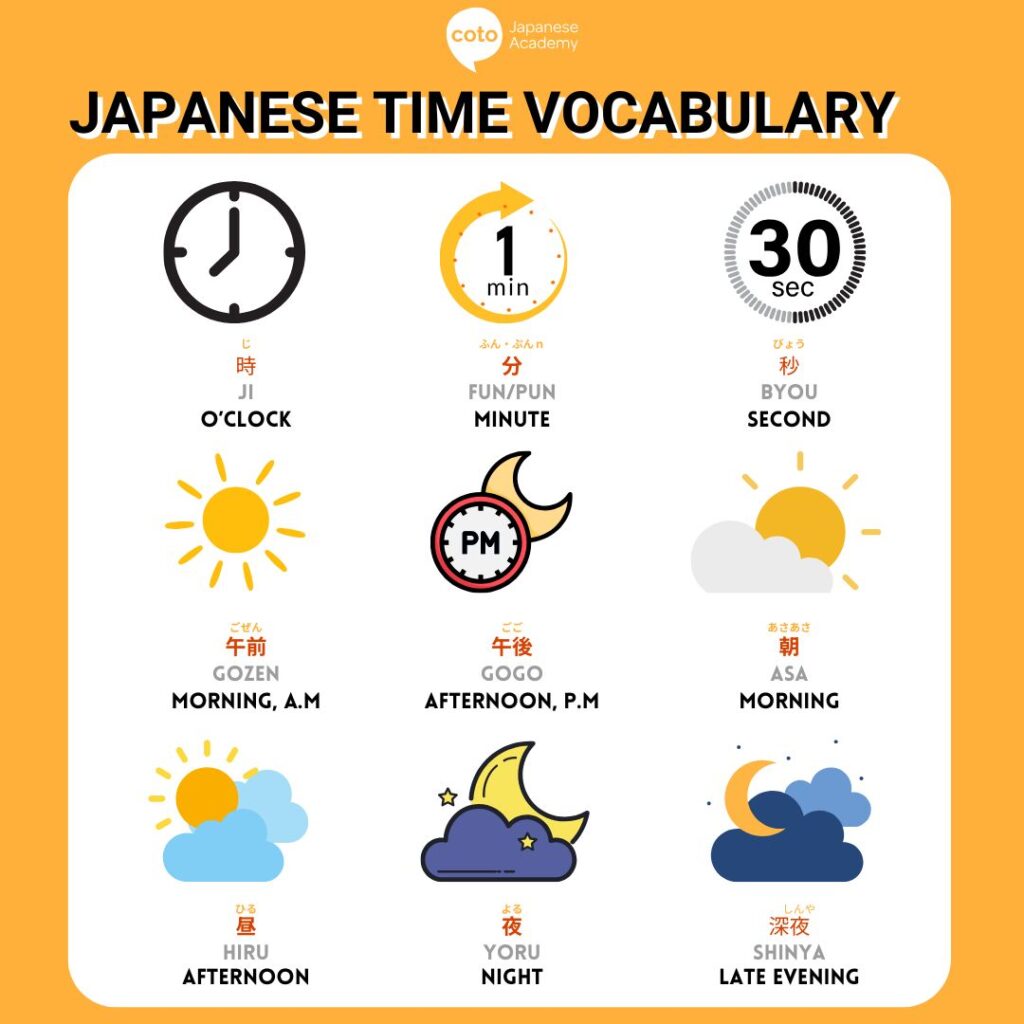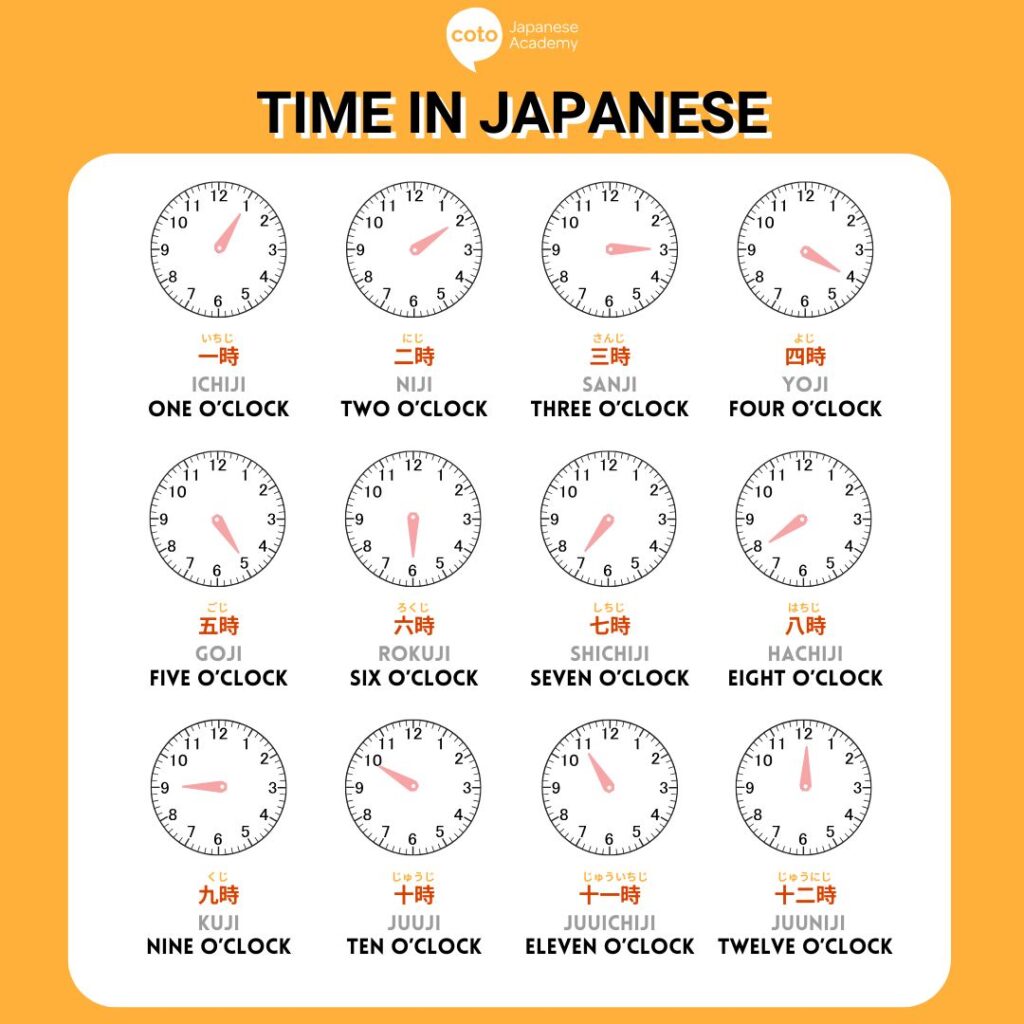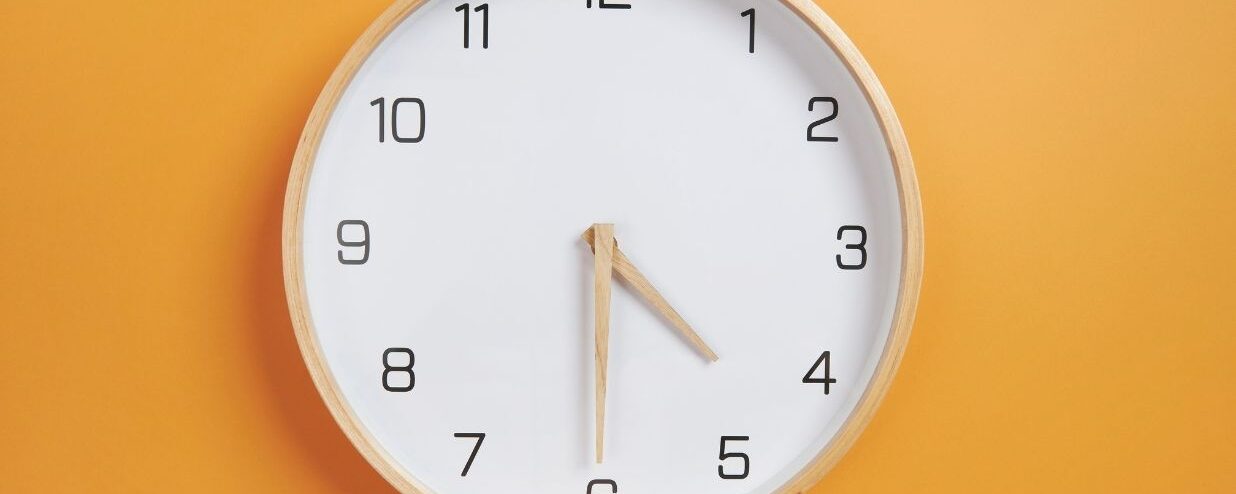Being able to tell time in Japanese is a survival skill, especially if you’re living in or visiting the country.
How else can you catch a train, book a meeting, or talk about your daily routine? Understanding how to tell time in Japanese is essential for navigating schedules in Japan. As we know, in Japan, punctuality is key, so minutes — and even seconds — matter. It could be the difference between coming home and missing the last train.
Luckily, you’re in the right place. This guide will teach you everything you need to know: how to ask for the time, tell time accurately, describe durations, and use time expressions naturally in conversation. Let’s dive in and master the art of telling time in Japanese and never miss a moment!
The basics of telling time in Japanese

We wanted to preface this by saying that you should first learn how to say numbers in Japanese. After all, time is built on numbers, no matter the language.
The good news is that telling the time in Japan uses a simple Japanese counter or measure of units. You can either tell time using the 24-hour clock or a 12-hour clock that includes 午前 (ごぜん) gozen, and pm, 午後(ごご) gogo.
To say the time in Japanese, you combine numbers with specific counters — a common pattern in the language. Here is how you can conjugate numbers into hours and minutes for time:
Basic time structure
The basic time structure in Japanese is very similar to English: you say the hour first, followed by the minute. Unlike some languages, Japanese does not reverse this order, so it’s always hour, then minute.
| Hour | Minute |
|---|---|
| 時 (ji) | 分 (fun/pun) |
For hours, simply add 時(じ) ji at the end after the number. For example, to say 10 o’clock, simply say:
10時
じゅうじ
juuji
Of course, in this case, some people might find it vague if you are talking about 10 o’clock in the morning or at night. If you are following a 12-hour format, you can always include the word 午前 (ごぜん) gozen, and pm, 午後(ごご) gogo.
| Japanese | Furigana | Furigana | Example |
|---|---|---|---|
| 午前 | ごぜん | AM / Morning | 午前10時 (10 AM) |
| 午後 | ごご | PM / Afternoon | 午後3時 (3 PM) |
For minutes, you just need to add the word fun or pun (分). If you are following the 12-hour format, you will add the 午前 (ごぜん) gozen, and pm, 午後(ごご) gogo first. For example, to say 10:15 am in Japanese, you say the hour first, then the minutes:
午前10時15分
ごぜん じゅうじ じゅうごふん
gozen juuji juugofun
This breaks down as:
- 午前 (ごぜん・gozen) = AM
- 10時 (じゅうじ・juuji) = 10 o’clock
- 15分 (じゅうごふん・juugofun) = 15 minutes
Hours, minutes, and time in Japanese
Japanese hours chart

When learning to tell time in Japanese, one of the first things you’ll need to master is how the hours are pronounced. Unlike English, some hours have unique or irregular pronunciations that don’t follow the usual number reading. For example, 4 o’clock isn’t yonji but yoji, and 7 o’clock is shichiji instead of nanaji.
To help you get comfortable with these differences, an hour chart is a great tool. It shows you the correct way to say each hour, so you can avoid common mistakes and speak more naturally. Once you’re familiar with the hour chart, telling time in Japanese will become much easier and more intuitive.
| Hour | Japanese (Kanji + Kana) | Reading (Romaji) | Notes |
|---|---|---|---|
| 1時 | いちじ | ichiji | |
| 2時 | にじ | niji | |
| 3時 | さんじ | sanji | |
| 4時 | よじ | yoji | Irregular reading |
| 5時 | ごじ | goji | |
| 6時 | ろくじ | rokuji | |
| 7時 | しちじ | shichiji | Irregular reading |
| 8時 | はちじ | hachiji | |
| 9時 | くじ | kuji | |
| 10時 | じゅうじ | juuji | |
| 11時 | じゅういちじ | juuichiji | |
| 12時 | じゅうにじ | juuniji |
When speaking, both 12-hour and 24-hour formats are used depending on the context, but the 24-hour clock is very common in written schedules and formal settings. Remember that if you use the 24-hour clock, you should not use the
Using the 24-hour format can help avoid confusion about AM and PM times, especially when catching trains or flights.
Here’s a table showing Japanese hours in the 24-hour format:
| 24-Hour | Kanji | Furigana | Romaji |
|---|---|---|---|
| 0:00 | 0時 | れいじ | reiji |
| 1:00 | 1時 | いちじ | ichiji |
| 2:00 | 2時 | にじ | niji |
| 3:00 | 3時 | さんじ | sanji |
| 4:00 | 4時 | よじ | yoji |
| 5:00 | 5時 | ごじ | goji |
| 6:00 | 6時 | ろくじ | rokuji |
| 7:00 | 7時 | しちじ | shichiji |
| 8:00 | 8時 | はちじ | hachiji |
| 9:00 | 9時 | くじ | kuji |
| 10:00 | 10時 | じゅうじ | juuji |
| 11:00 | 11時 | じゅういちじ | juuichiji |
| 12:00 | 12時 | じゅうにじ | juuniji |
| 13:00 | 13時 | じゅうさんじ | juusanji |
| 14:00 | 14時 | じゅうよじ | juuyoji |
| 15:00 | 15時 | じゅうごじ | juugoji |
| 16:00 | 16時 | じゅうろくじ | juurokuji |
| 17:00 | 17時 | じゅうしちじ | juushichiji |
| 18:00 | 18時 | じゅうはちじ | juuhachiji |
| 19:00 | 19時 | じゅうくじ | juukuji |
| 20:00 | 20時 | にじゅうじ | nijuuji |
| 21:00 | 21時 | にじゅういちじ | nijuuichiji |
| 22:00 | 22時 | にじゅうにじ | nijuuniji |
| 23:00 | 23時 | にじゅうさんじ | nijuusanji |
| 24:00 | 24時 | にじゅうよじ | nijuuyoji |
Tips: After-hours time in Japan
In standard timekeeping, hours only go up to 24 (midnight). However, in some contexts like TV schedules, nightlife, or bars, you might see times listed as 25時 or 26時 to mean 1 AM or 2 AM the next day. This helps avoid confusion by extending the “day” past midnight without switching the date.
For example, you might see the “closing” hours of a night bar in Tokyo as below:
- 25時 = 1 am (next day)
- 26時 = 2 am (next day)
This means the bar closes at 1 or 2 AM, but it’s still considered part of the previous day’s schedule.
Reminder:
When using the 24-hour time format in Japanese, you do not use 午前 (ごぜん, gozen) or 午後 (ごご, gogo). Instead, simply state the hour followed by 時 (じ, ji). For example, 15:00 is said as 15時 (じゅうごじ, juugoji) — “15 o’clock.” This format is commonly used for schedules like train timetables and official announcements.
Japanese minute chart
To say minutes in Japanese, you simply add the counter 分 (fun or pun) after the number. However, the pronunciation changes depending on the number you use. For example, 1 minute is pronounced いっぷん (ippun), while 2 minutes is にふん (nifun). When saying 10 minutes, the pronunciation changes to じゅっぷん (juppun), and this pun sound pattern also applies to other multiples of ten, like 20, 30, 40, and 50 minutes.
To better understand, please refer to the Japanese minute chart below:
| English | Kanji | Furigana | Romaji |
|---|---|---|---|
| 1 minute | 一分 | いっぷん | ippun |
| 2 minutes | 二分 | にふん | nifun |
| 3 minutes | 三分 | さんぷん | sanpun |
| 4 minutes | 四分 | よんぷん | yonpun |
| 5 minutes | 五分 | ごふん | gofun |
| 6 minutes | 六分 | ろっぷん | roppun |
| 7 minutes | 七分 | ななふん | nanafun |
| 8 minutes | 八分 | はっぷん | happun |
| 9 minutes | 九分 | きゅうふん | kyuufun |
| 10 minutes | 十分 | じゅっぷん | juppun |
| 15 minutes | 十五分 | じゅうごふん | juugofun |
| 30 minutes | 三十分 | さんじゅうぷん | sanjuupun |
| 40 minutes | 四十分 | よんじゅうぷん | yonjuupun |
| 50 minutes | 五十分 | ごじゅうぷん | gojuupun |
The shift between fun and pun comes from a phonetic phenomenon called rendaku, where a sound becomes voiced (or changes) when repeated or combined with certain words. It’s a bit complex, so this isn’t the place to dive deep (for that, check out our guide on Japanese long vowels and double consonants).
The conjugation may seem confusing at first, but you will soon develop an instinct for what sounds right. For now, try to remember the following numbers have the pun pronunciation:
- 1 minute: 一分 (ippun)
- 3 minutes: 三分 (sanpun)
- 6 minutes: 六分 (roppun)
- 8 minutes: 八分 (happun)
- 10 minutes: 十分 (juppun)
For now, just know that sometimes 分 is pronounced fun and sometimes pun, depending on the number it follows.
Japanese seconds chart
It’s pretty rare to need to tell the exact time, including seconds, in everyday Japanese. However, knowing how to use seconds (秒・びょう・byou) can be useful when you’re using it as a counter — for example, when heating food for 30 seconds or seeing a countdown with 10 seconds left. Understanding this helps you talk about short durations clearly and naturally.
| Kanji | Hiragana | Romaji | English |
|---|---|---|---|
| 1秒 | いちびょう | ichibyou | 1 second |
| 2秒 | にびょう | nibyou | 2 seconds |
| 3秒 | さんびょう | sanbyou | 3 seconds |
| 4秒 | よんびょう | yonbyou | 4 seconds |
| 5秒 | ごびょう | gobyou | 5 seconds |
| 6秒 | ろくびょう | rokubyou | 6 seconds |
| 7秒 | ななびょう | nanabyou | 7 seconds |
| 8秒 | はちびょう | hachibyou | 8 seconds |
| 9秒 | きゅうびょう | kyuubyou | 9 seconds |
| 10秒 | じゅうびょう | juubyou | 10 seconds |
| 20秒 | にじゅうびょう | nijuu byou | 20 seconds |
| 30秒 | さんじゅうびょう | sanjuu byou | 30 seconds |
| 40秒 | よんじゅうびょう | yonjuu byou | 40 seconds |
| 50秒 | ごじゅうびょう | gojuu byou | 50 seconds |
| 60秒 | ろくじゅうびょう | rokujuu byou | 60 seconds |
Putting it all together
Now that we have learned each element of time in Japanese, let’s put it all together!
| Time | Kanji | Furigana | Romaji |
|---|---|---|---|
| 7:00 AM | 午前7時 | ごぜん しちじ | gozen shichiji |
| 12:15 PM | 午後12時15分 | ごご じゅうにじ じゅうごふん | gogo juuniji juugofun |
| 3:30 PM | 午後3時30分 | ごご さんじ さんじゅっぷん | gogo sanji sanjuppun |
| 6:45 PM | 午後6時45分 | ごご ろくじ よんじゅうごふん | gogo rokuji yonjuugofun |
| 9:10:30 AM | 午前9時10分30秒 | ごぜん くじ じゅっぷん さんじゅうびょう | gozen kuji juppun sanjuubyou |
The good news is that in most public places in Japan, time is usually displayed using familiar Arabic numerals. However, when speaking or listening to time expressed in Japanese, it’s still important to know how to say it properly.
At first, telling time in Japanese can feel overwhelming — even like a tongue twister! The best way to get comfortable is to practice regularly. Try picking random times throughout the day and quickly say them out loud in Japanese as much as possible. With practice, it will soon feel natural and easy.
Phrases for asking the time in Japanese
How do you ask someone for the time? Or find out when the next train is departing? In Japan, telling time isn’t just about stating the hour. You also need to know how to ask the right questions and understand the answers
Here are some useful phrases for asking about the time in Japanese to help ensure you don’t miss your train or your important meeting.
1. 何時ですか?
なんじですか?
Nanjidesuka
What time is it?
2. 次の電車は何時ですか?
tsugi no densha wa nanjidesuka?
When is the next train?
3. 何時に集合ですか?
nanji ni shuugou desuka?
What time do we meet up?
Here is another handy list of time-related statements and answers you can use to answer these questions.
| Japanese | Romaji | English Translation |
|---|---|---|
| 午後3時です。 | Gogo sanji desu. | It’s 3 PM. |
| 電車は5分後に出発します。 | Densha wa gofun go ni shuppatsu shimasu. | The train departs in 5 minutes. |
| 次の電車は10時15分に来ます。 | Tsugi no densha wa juuji juu-go fun ni kimasu. | The next train arrives at 10:15. |
| 電車はもうすぐ来ます。 | Densha wa mousugu kimasu. | The train is coming soon. |
| あと30分待ってください。 | Ato sanjuppun matte kudasai. | Please wait another 30 minutes. |
Don’t forget that learning the dates is just as important as telling time. Read our guide to learn everything you need to know about days and months in Japanese!
Other ways to tell time in Japanese
Sometimes it’s a bit of a mouthful to say the time in Japanese. So, just like in English, there are useful and simpler ways to tell the time. Something like 12:30 — juuniji sanjuuppun — might be a lot to say in Japanese.
While Japanese doesn’t use expressions like “quarter past” or “quarter to,” there is a simple and common way to say “half past” the hour! Instead of saying 30 minutes, you can use 半 (はん, han), which means “half.”
For example:
12時半
Juuniji han
Half past 12
You can also express minutes before an hour by adding 前 (まえ, mae), which means “before,” after the minutes counter 分 (ふん, fun/pun). This creates the pattern 〜分前 (〜fun mae), meaning “~ minutes until” the hour.
For example, 6時5分前 (rokuji gofun mae) means “5 minutes before 6,” or “5 minutes till 6.”
6時5分前
Rokuji gofunmae
5 minutes before 6
While Japanese doesn’t have a specific expression for “quarter till,” you can simply say 15 minutes before using the same pattern:
6時15分前
Rokuji juugofun mae
15 minutes (quarter) till 6
Describing time durations
Now that you know how to tell the time, how do you talk about durations — like how long you sleep or how long it takes to get to work?
When 時 (じ, ji) is attached to a number, it refers to the hour on the clock. But the word 時間 (じかん, jikan) means “time” in the sense of a duration or length of time. For example, if you want to ask, “Do you have time today?” you would use 時間 (jikan):
今日時間はありますか?
Kyou jikan wa arimasuka.
Do you have the time today?
You can use jikan to describe a time duration as well. If you want to say you study for 3 hours, you would say:
3時間勉強します
Sanjikan benkyou shimasu
I will study for 3 hours.
To describe the duration in minutes, it is the same as telling the time. You don’t need to add 間 (kan), for minutes; you just need to use the minute counter, like 5分 (gofun). If you want to say you walk 20 minutes to get to school, you can say:
20分学校に歩きます
Nijuupun gakkou ni arukimasu.
I walk to school in 20 minutes.
Here’s a clear and useful table of common Japanese expressions for time duration, including kanji, kana, romaji, and English meanings:
| Kanji | Furigana | Romaji | English |
|---|---|---|---|
| 1時間 | いちじかん | ichijikan | 1 hour |
| 2時間 | にじかん | nijikan | 2 hours |
| 3時間 | さんじかん | sanjikan | 3 hours |
| 半時間 | はんじかん | hanjikan | Half an hour |
| 30分 | さんじゅっぷん | sanjuppun | 30 minutes |
| 10分 | じゅっぷん | juppun | 10 minutes |
| 数分 | すうふん | suufun | A few minutes |
| 数時間 | すうじかん | suujikan | A few hours |
| 長い時間 | ながいじかん | nagai jikan | A long time |
| 短い時間 | みじかいじかん | mijikai jikan | A short time |
| 一晩 | ひとばん | hitoban | One night |
| 一週間 | いっしゅうかん | isshuukan | One week |
| 一ヶ月 | いっかげつ | ikkagetsu | One month |
Check out some more example sentences below!
ここから駅まで30分かかります。
Koko kara eki made sanjuuppun kakarimasu.
It takes 30 minutes from here to the station.
映画は2時間半でした。
Eiga wa nijikan han deshita.
The movie was two and a half hours long.
5分待ってください。
Gofunkan matte kudasai.
Please wait for 5 minutes
Saying “from” and “until” in Japanese

To describe when something starts and ends in Japanese, you can use 〜から (~kara) meaning “from,” and 〜まで (~made) meaning “until.” When making plans or scheduling events, these expressions help you clearly state the exact time an activity begins and finishes.
For example, to say “The meeting is from 2 pm to 4 pm,” you would say:
会議は午後2時から午後4時までです。
Kaigi wa gogo niji kara gogo yoji made desu.
This meeting is from 2 pm to 4 pm.
Check out some more example sentences below!
9時から5時まで働いています。
Kuji kara goji made hataraiteimasu.
I work from 9 to 5.
授業は10時から11時半までです。
Jugyou wa jyuuji kara jyuuichiji han made desu.
The class is from 10:00 to 11:30.
パーティーは6時からです。
Paatii wa rokuji kara desu.
The party starts at 6 o’clock.
Common time frequency expressions
Here are some useful time expressions to describe frequency — how often something happens, like how many times you eat or how many nights you practice basketball. The table below introduces key vocabulary that will help you talk about how often events occur in Japanese.
| Kanji | Furigana | Romaji | English |
|---|---|---|---|
| 毎日 | まいにち | mainichi | every day |
| 毎朝 | まいあさ | maiasa | every morning |
| 毎晩 | まいばん | maiban | every night |
| 時々 | ときどき | tokidoki | sometimes |
| 大抵 | たいてい | taitei | usually |
| いつも | itsumo | always | |
| いつ | itsu | when | |
| よく | yoku | often |
毎日ご飯を食べます。
Mainichi gohan o tabemasu.
I eat rice every day.
時々公園へ散歩に行きます。
Tokidoki kouen e sanpo ni ikimasu
Sometimes I go on walks to the park.
ステーキは一番好きな肉なので、よく食べます
Suteeki ha ichiban sukina nikunanode, yoke tabemasu.
I often eat steak since it’s my favorite meat.
For more basic vocabulary to increase your repertoire, check out the blog: Top 100 Basic Japanese Words
Time to wrap up!
Telling time in Japanese is a vital part of daily communication. With a few simple rules and key expressions, you’ll be able to confidently read clocks, schedule plans, and talk about time just like a native speaker.
To get more practice around practical everyday Japanese, such as telling the time, why not join fun, flexible lessons at Coto Academy! We offer both offline and online Japanese part-time and Japanese intensive lessons to help you speak confidently and smoothly!
Fill out the form below for a free level check and consultation
FAQ
How do you tell the time in Japanese?
To tell time in Japanese, simply add the hour counter 時 (ji) and the minute counter 分 (fun/pun) after the numbers.
For example, 9:20 is said as:
9時20分 (kyuuji nijuu-pun)
= 9 o’clock and 20 minutes
Can you say 分間 (funkan) for the duration of minutes?
You don’t need to say 分間 (funkan)—just 分 (fun) is usually enough. However, 分間 can be used to emphasize the duration
Do Japanese people usually use the 24-hour time or am/pm?
In Japan, the 24-hour clock is commonly used, especially for things like train schedules or business hours.
However, am and pm are also used, especially in conversation.
Is it kuji or kyuuji?
It’s Kuji (くじ) for 9 o’clock when telling time in Japanese.
How do you write 9 am in Japanese?
9 am is written as 午前9時 (gozen kuji) in Japanese.
How do you say 2:30 in Japanese?
You say 2時半 (ni-ji han), which means “half past 2.”
Love our content? You might be interested in:
